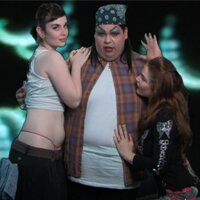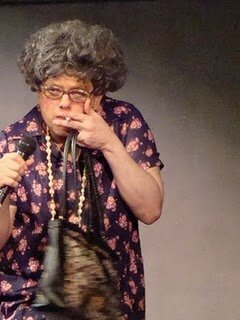 Onwards and upwards with SPF #5! Today–five questions with Gerald Alejandro Ford, whose Chicha plays tonight and April 30 (tickets $12 adv./$15 door). For all our coverage of this year’s SPF, see here.
Onwards and upwards with SPF #5! Today–five questions with Gerald Alejandro Ford, whose Chicha plays tonight and April 30 (tickets $12 adv./$15 door). For all our coverage of this year’s SPF, see here.
1. Where did you grow up, and how did you end up where you are now?
I grew up in Tucson, Arizona. I left because I was tired of being asked to show my papers every time I ran into a cop. I’m kidding, I miss my hometown but I don’t have plans to move back any time soon. I moved up here so I could study at Cornish College of the Arts. I received my BFA in Theater with an emphasis in Original Works. I love Seattle, but I have itchy feet. My ideal situation is to not have any one place to live. I would like to go on tour performing. If I keep getting work in Seattle I’ll stay, if a better offer comes from another place that’s where I’ll go.
2. Which performance, song, play, movie, painting, or other work of art had the biggest influence on you and why?
All of John Waters’s films, I was exposed to them as a kid by my uncle. I remember laughing and being disgusted at the same time during these films. That feeling has shaped my sense of humor and I crave all things funny/raunchy. I have developed my own style when it comes to the shows I write, but you can see how Mr. Waters has had an influence on me. One of my dreams is to be in one of his films someday.
3. What skill, talent, or attribute do you most wish you had and why?
I wish that I could drive. I mean, I know how to drive (basically) I just never got my license. This is something I could have easily fixed but I just never find the time to. I also wish my Spanish was better so that I wouldn’t look stupid when I’m on Telemundo.
4. What do you do to make a living? Describe a normal day.
Well, all I can say is that I work at a Seattle Tourist Attraction. I deal with tourists all day and it’s pretty much just a day job. I would hate to still see me working in this industry in a few years. During the evenings or my days off I go on auditions or rehearsals for a show or I am writing new material. I’m always busy and yet I still find time to procrastinate and be lazy.
5. Why solo performance? What made you decide to pursue this show in this form?
I’m kind of selfish because I honestly don’t trust anyone else to perform the show the way I want it. Most of my shows have dialogue between several characters and it could be cast with many people, but then the rhythm and comedy would be lost. Plus less actors means cheaper production and more pay for me. My first solo show was my Cornish senior project and it was called EL ULTIMO COCONUT. It was about a Mexican American teen who was socially awkward and addicted to World of Warcraft. That show received the city of Seattle’s Smartventure grant and was used as the inaugural production of the newly formed Latino Theater Collective, eSe Teatro. I even made some money off of it, which is unheard of for Cornish Senior Projects. I expect to have even more success for Chicha. There is something about this character that people will love. The show is outrageous, when you have a mix or prison life, the fashion world, cholas (Mexican American gangstas) and lesbians in one story it has to be good right? This isn’t another Drag act. This is essentially a love story, I hope to have everyone dancing and crying at the end. SPF #5 here I come!

